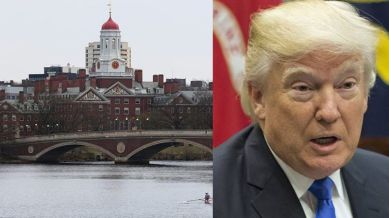Funding cuts, federal investigations, escalating pressure — the Trump administration’s ongoing battle with Harvard University reached a new peak on Thursday, when the Department of Homeland Security revoked the school’s certification to host international students. The move, effectively blocking Harvard’s access to the Student and Exchange Visitor Information System (SEVIS), left nearly 7,000 foreign students in limbo and sent shockwaves through the higher education sector.
What began as a presidentially commissioned Joint Task Force to combat antisemitism has turned into a full-time feud between the university and the Trump administration. The White House has gone after several universities, including Columbia and Harvard, accusing them of allowing antisemitic sentiments on their campuses.
In response, the government has increased pressure on these schools by cutting federal funding. Earlier this year, the administration cut $400 million in federal grants and contracts to Columbia University, citing the school’s “inaction in the face of persistent harassment of Jewish students.”
Harvard has also been on the receiving end of many such tactics. So far, the administration’s actions have not convinced the prestigious and historic university to back down or give in to its demands.
Here are all the major actions taken by the Trump administration in recent times:
April 11 – The controversial letter
A letter was sent to Harvard by the administration’s Antisemitism Joint Task Force demanding sweeping changes at the university, including banning face masks, dismantling diversity, equity and inclusion (DEI) programs, and cooperating with immigration authorities.
Three individuals briefed on the situation said some White House officials believed the letter was meant only for internal circulation, while others thought it had been released prematurely
Story continues below this ad
However, Harvard didn’t welcome the demands. Calling these demands ‘intrusive’, the university vowed to publicly resist. Harvard President Alan Garber issued a firm response, saying, “The university will not surrender its independence or relinquish its constitutional rights.”
The Trump administration did not respond lightly.
April 14 – Federal funds frozen
It retaliated by freezing $2.2 billion in federal grants and $60 million in multi-year contracts awarded to Harvard. It further criticised the university’s stance, accusing it of perpetuating “a troubling entitlement mindset” regarding federal funds.
In response, Harvard filed a lawsuit to halt the federal freeze on the grants. Trump also threatened to strip Harvard of its tax-exempt status, which the university holds under IRS rules as a nonprofit educational institution.
“We are going to be taking away Harvard’s Tax Exempt Status. It’s what they deserve!” Trump posted on Truth Social.
April 22 – NIH grant freeze
Story continues below this ad
The administration froze roughly 500 grants for Harvard-affiliated institutions from the National Institutes of Health (NIH), according to two senior officials at the Health Department, who spoke on the condition of anonymity.
Recipients of these grants include Brigham and Women’s Hospital, an internationally recognized teaching hospital in Boston known for its research on heart disease and cancer. The status of these grants remains paused.
May 13 – Additional grant cuts
The Trump administration announced an additional $450 million in federal grant cuts to Harvard University.
According to the Antisemitism Task Force, the move was in response to Harvard’s failure to address “pervasive race discrimination and antisemitic harassment” on campus.
May 19 – HHS statement
Story continues below this ad
The Department of Health and Human Services confirmed the cuts in a social media post, citing Harvard’s “continued failure to address antisemitic harassment and race discrimination.”
May 22 – SEVIS certification revoked
In the most recent and controversial action yet, Homeland Security Secretary Kristi Noem stripped Harvard of access to the Student and Exchange Visitor Information System (SEVIS)—a federal database that tracks international students and is essential for maintaining their visa status.
Apart from all the measures, Trump administration also launched many investigations against the university.
1. Education Department inquiry into allegations of harassment of Jewish students
2. Antisemitism Task Force review of all contracts for Harvard and its affiliates
3. Homeland Security investigation into international student enrollment
4. Education Department investigation into disclosures of foreign gifts
5. Equal Employment Opportunity Commission inquiry into accusations of discrimination against white, Asian, male and heterosexual applicants
6. Joint agency investigation into accusations of racial preferences at the Harvard Law Review
7. Education Department review of admissions policies
8. Justice Department investigation into whether the school’s admission policies defrauded the government
Story continues below this ad
Can the government stop Harvard from enrolling international students?
Yes, the government can remove colleges from SEVIS, making them ineligible to host foreign students on their campus.
The US government has authority over who comes into the country, and the Department of Homeland Security oversees which colleges are part of the Student Exchange and Visitor Program.
However, this power has mostly been exercised for administrative reasons such as failing to maintain accreditation, lacking proper facilities for classes, failing to employ qualified professional personnel — even failing to “operate as a bona fide institution of learning.”
(With inputs from New York Times)
